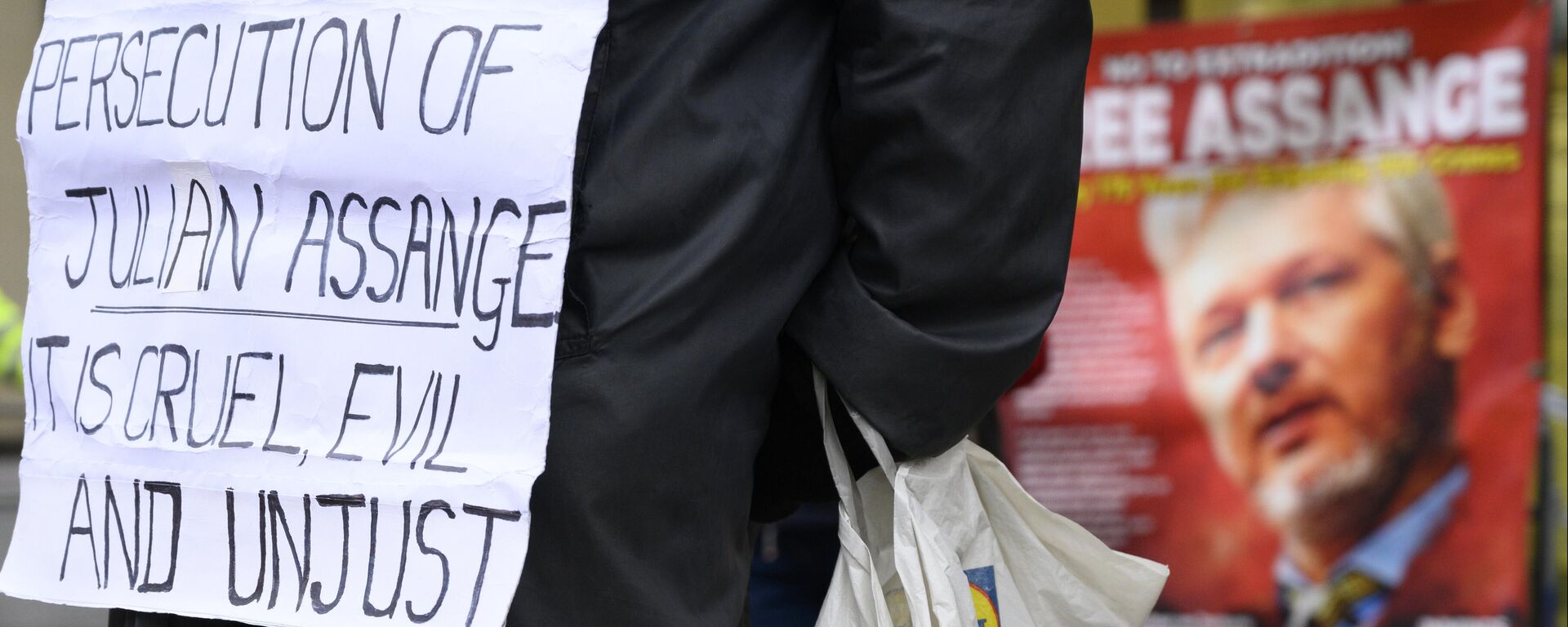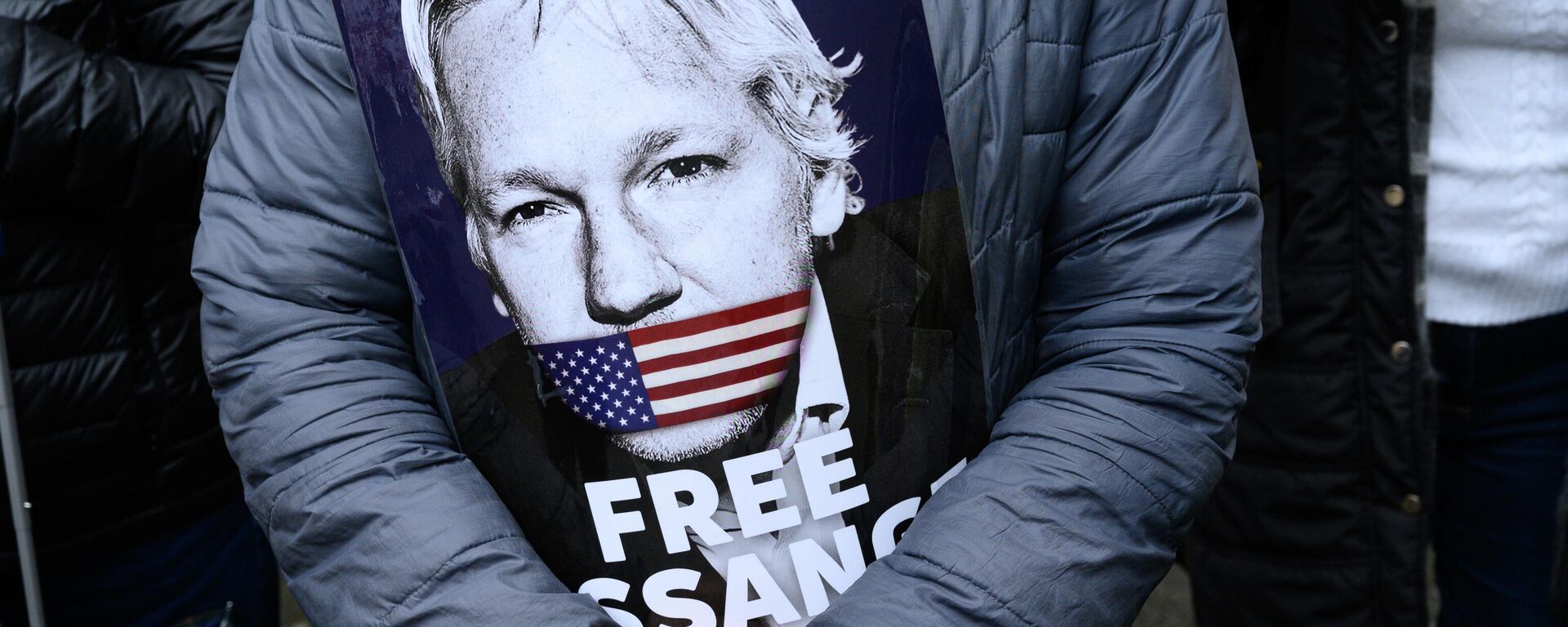https://sputnikglobe.com/20240329/worse–worse-abusive-us-prison-systems-and-assanges-denial-of-due-process–1117625379.html
‘Worse & Worse’: Abusive US Prison Systems and Assange’s Denial of Due Process
‘Worse & Worse’: Abusive US Prison Systems and Assange’s Denial of Due Process
Sputnik International
The US must provide assurances that neither of these instances will happen, and therefore the trial can move to another phase where Assange’s legal team may debate the validity of those assurances.
2024-03-29T07:49+0000
2024-03-29T07:49+0000
2024-03-29T07:50+0000
analysis
assange
wikileaks founder julian assange case
julian assange
julian assange arrest
united kingdom (uk)
freedom of speech
wikileaks
free press
freedom of the press
https://cdn1.img.sputnikglobe.com/img/07e8/03/1d/1117629624_0:215:3072:1943_1920x0_80_0_0_85dd463441b190ae401d5c56f5ac6770.jpg
The US must provide assurances that neither of these instances will happen, and therefore the trial can move to another phase where Assange’s legal team may debate the validity of those assurances. If they do not, then the limited appeal will move forward. One journalist noted that this will continue to obstruct Assange’s due process and therefore his most basic legal rights—which has been going on for more than a decade.Sputnik’s John Kiriakou, a co-host of Political Misfits, is a former CIA counterterrorism officer and a former senior investigator with the Senate Foreign Relations Committee. He became the sixth whistleblower indicted by the Obama administration under the Espionage Act and served 23 months in prison as a result of his attempt to oppose the Bush administration’s torture program.Kiriakou recently wrote in an article “Assange and the Sickness of US Prisons”, that the US prison medical system is “utterly broke”, and described a prisoner he personally knew who was given Tylenol for stage 4 cancer in his spine and who would later die in prison. Kiriakou sat down with The Critical Hour on Thursday to discuss Assange’s predicament.“People forget Julian Assange spent so many years in what amounted to solitary confinement in the Ecuadorian embassy in London. And so, you tend to go crazy, not having access to the outside world. There’s almost nothing you can do about it,” says Kiriakou. “Now, we know from a multitude of studies that have been done in prison systems here in the United States, both at the federal and state levels that 85% of incarcerated people in the United States have some form of diagnosable mental illness.”“Even if they didn’t go into prison with mental illness, they develop it in prison, and it’s because of solitary confinement,” Kiriakou adds.Kirakou wrote in his piece about a report from the Washington Lawyers Committee on Civil Rights in Urban Affairs which exposed such abuses at the hands of the Federal Bureau of Prisons, which is the same entity that would be responsible for Assange’s health.Sputnik’s Wilmer Leon noted that while in prison, a prisoner does not only have to fear harm from their fellow cellmates, but are also subjected to trauma inflicted by prison guards. “That’s right. In many cases, guards are worse,” says Kiriakou. “There’s a case in California right now, at the federal level. It’s a Federal Bureau of Prisons women’s prison, called FCI Dublin in Dublin, California. And, that prison was known as the ‘rape club.’ So far, six officials at the prison, including the warden, the prison doctor, three guards and the chaplain, if you can imagine this, raped dozens of female prisoners, would beat them if they would not submit to the rape and are just now working their ways through the legal system.”Sputnik’s Wilmer Leon noted that there has been a “dramatic shift” in the philosophy of incarceration in the US, which can most likely be attributed to the mid to late 1970s as well as the “war on drugs”—first inaugurated by President Richard Nixon in the early 1970s—which shifted the philosophy from a rehabilitation model to an incarceration model.“So true, so true,” Kiriakou agreed. “You know, things began to change in the late 1970s. They changed very much in the mid-1980s. But you’re exactly right. Before the Reagan presidency, if you were incarcerated, you could learn a skill. You could get your GED. If you didn’t have a high school diploma, then you could learn small engine repair, plumbing, electrical work, any number of different things. Now, you can’t do any of that.”“Where they do teach you a skill, where they do give you medical care and mental health care. And instead of over-stuffing people in bleak prison cells, put them in what looked like apartments so that they can transition back into normal society when their prison sentences are up. We just don’t understand that.”Leon noted that rehabilitating criminals has been “abolished” and that prisons have now come under an aspect of privatization.“Furniture making is a good example,” Kiriakou explained. “At the prison where I was incarcerated, FCI Laredo in central Pennsylvania, there was a Prison Industries factory where they manufactured fiber optic cables for the US Navy. Well, when you’re paying people $0.25 an hour and forcing them to work 40 hours a week for that quarter an hour and putting outside businesses out of business because they can’t pay their workers $0.25 an hour. You know, you’re actually doing damage to the community.”“It just gets worse and worse and worse,” said Kiriakou. “And again, we find ourselves just shocked that we have these problems. And so, the idea is, if these prisoners do their sentences and then they become repeat offenders and the recidivism rate is high, that must mean that our sentences aren’t long enough, and, in fact, our sentences are the longest of any industrialized country.”“And I wrote a separate piece, not too long ago, saying that in the last 10 years, Congress has created 500 new crimes, not 500 new laws, 500 new crimes, things that were perfectly legal 10 years ago that are now felonies,” he added. And so, the bottom line is, if they want to get you, they’re going to get you.”
https://sputnikglobe.com/20240327/is-biden-administration-slow-rolling-assange-case-to-keep-journalist-in-limbo-1117573772.html
https://sputnikglobe.com/20240326/uk-court-ruling-grants-assange-reprieve-and-strong-chance-to-appeal-extradition-1117567387.html
https://sputnikglobe.com/20240326/moscow-on-london-courts-decision-on-assange-uk-justice-system-becomes-laughing-stock-1117566511.html
united kingdom (uk)
london
2024
Mary Manley
https://cdn1.img.sputnikglobe.com/img/07e6/01/0b/1092187887_0:0:2048:2049_100x100_80_0_0_0c2cc4c84f89aff034cc55bb01fb6697.jpg
Mary Manley
https://cdn1.img.sputnikglobe.com/img/07e6/01/0b/1092187887_0:0:2048:2049_100x100_80_0_0_0c2cc4c84f89aff034cc55bb01fb6697.jpg
News
en_EN
https://cdn1.img.sputnikglobe.com/img/07e8/03/1d/1117629624_0:0:2732:2048_1920x0_80_0_0_f45936cce97722bf28f0a80e9a206085.jpg
Mary Manley
https://cdn1.img.sputnikglobe.com/img/07e6/01/0b/1092187887_0:0:2048:2049_100x100_80_0_0_0c2cc4c84f89aff034cc55bb01fb6697.jpg
assange, julian assange, us prison systems, julian assange misdemeanor, julian assange plea deal, julian assange reprieve, julian assange extradiction delayed, julian assange political persecution, julian assange kidnapped, julian assange murdered, jullian assange spied on, biden julian assange, julian assange first amendment, julian assange death penalty, freedom of speech, freedom of press, free press
assange, julian assange, us prison systems, julian assange misdemeanor, julian assange plea deal, julian assange reprieve, julian assange extradiction delayed, julian assange political persecution, julian assange kidnapped, julian assange murdered, jullian assange spied on, biden julian assange, julian assange first amendment, julian assange death penalty, freedom of speech, freedom of press, free press
The High Court of England and Wales has ruled that WikiLeaks Founder Julian Assange may get a final appeal against extradition to the United States, but only if particular conditions are met: his freedom of speech might be restricted in the US, and there is a possibility he could receive the death penalty.
Sputnik’s John Kiriakou, a co-host of Political Misfits, is a former CIA counterterrorism officer and a former senior investigator with the Senate Foreign Relations Committee. He became the sixth whistleblower indicted by the Obama administration under the Espionage Act and served 23 months in prison as a result of his attempt to oppose the Bush administration’s torture program.
“People forget Julian Assange spent so many years in what amounted to solitary confinement in the Ecuadorian embassy in London. And so, you tend to go crazy, not having access to the outside world. There’s almost nothing you can do about it,” says Kiriakou. “Now, we know from a multitude of studies that have been done in prison systems here in the United States, both at the federal and state levels that 85% of incarcerated people in the United States have some form of diagnosable mental illness.”
Assange’s Fate Awaits US ‘Assurances’ https://t.co/tpbQZHgw1L
The High Court on Tuesday rejected five Assange grounds for a new appeal, agreeing he had only three legitimate arguments but that the U.S. could nullify them with new “assurances,” reports Joe Lauria. pic.twitter.com/IHkQZWZLEL
— Consortium News (@Consortiumnews) March 26, 2024
“Even if they didn’t go into prison with mental illness, they develop it in prison, and it’s because of solitary confinement,” Kiriakou adds.
“It’s because of a lack of mental health care and physical health care. It’s because of being heaped into overcrowded, in many cases, dorm rooms or overcrowded cells. Many of us who have been to prison were fortunate in that we essentially escaped unscathed because our sentences were so short,» he explains. «But Julian Assange is facing 175 years in prison, and so there’s no upside to this.”
Kirakou wrote in his piece about a report from the Washington Lawyers Committee on Civil Rights in Urban Affairs which exposed such abuses at the hands of the Federal Bureau of Prisons, which is the same entity that would be responsible for Assange’s health.
Sputnik’s Wilmer Leon noted that while in prison, a prisoner does not only have to fear harm from their fellow cellmates, but are also subjected to trauma inflicted by prison guards.
“This kind of thing happens all the time. Because who’s going to believe you, it’s your word against the guard and you’re a criminal. So if the guard says you shoved him and he had to beat you unconscious to protect himself, they’re going to believe the guard and you’re going to end up in solitary confinement, even though you were the one who was attacked. And it gets worse than that,” Kiriakou adds. “This is the kind of system that Julian Assange is going to find himself in.”
Sputnik’s Wilmer Leon noted that there has been a “dramatic shift” in the philosophy of incarceration in the US, which can most likely be attributed to the mid to late 1970s as well as the “war on drugs”—first inaugurated by President Richard Nixon in the early 1970s—which shifted the philosophy from a rehabilitation model to an incarceration model.
“So true, so true,” Kiriakou agreed. “You know, things began to change in the late 1970s. They changed very much in the mid-1980s. But you’re exactly right. Before the Reagan presidency, if you were incarcerated, you could learn a skill. You could get your GED. If you didn’t have a high school diploma, then you could learn small engine repair, plumbing, electrical work, any number of different things. Now, you can’t do any of that.”
“You can still get a GED in a class taught by other prisoners, but you can’t learn a skill. And then we wonder why our recidivism rate is almost 50%, when the recidivism rates in Western Europe are under 20%,” Kiriakou said, referring to the legal term for a person’s relapse into criminal behavior.
“Where they do teach you a skill, where they do give you medical care and mental health care. And instead of over-stuffing people in bleak prison cells, put them in what looked like apartments so that they can transition back into normal society when their prison sentences are up. We just don’t understand that.”
Leon noted that rehabilitating criminals has been “abolished” and that prisons have now come under an aspect of privatization.
“Furniture making is a good example,” Kiriakou explained. “At the prison where I was incarcerated, FCI Laredo in central Pennsylvania, there was a Prison Industries factory where they manufactured fiber optic cables for the US Navy. Well, when you’re paying people $0.25 an hour and forcing them to work 40 hours a week for that quarter an hour and putting outside businesses out of business because they can’t pay their workers $0.25 an hour. You know, you’re actually doing damage to the community.”
“And then, because you’re paying your workers $0.25 an hour and there’s no pride in their work because they consider it to be slavery, which I do too, then they produce substandard fiber optic cable. And, as it turns out, 40% of the cable that they’re making for the US Navy is not usable. It’s just junk. It’s scrap. And, again, you’ve put people in the community outside the prison out of work by undercutting them with the slave labor that you’re using. It’s just simply not fair. It’s not right.”
“It just gets worse and worse and worse,” said Kiriakou. “And again, we find ourselves just shocked that we have these problems. And so, the idea is, if these prisoners do their sentences and then they become repeat offenders and the recidivism rate is high, that must mean that our sentences aren’t long enough, and, in fact, our sentences are the longest of any industrialized country.”
“And I wrote a separate piece, not too long ago, saying that in the last 10 years, Congress has created 500 new crimes, not 500 new laws, 500 new crimes, things that were perfectly legal 10 years ago that are now felonies,” he added. And so, the bottom line is, if they want to get you, they’re going to get you.”





